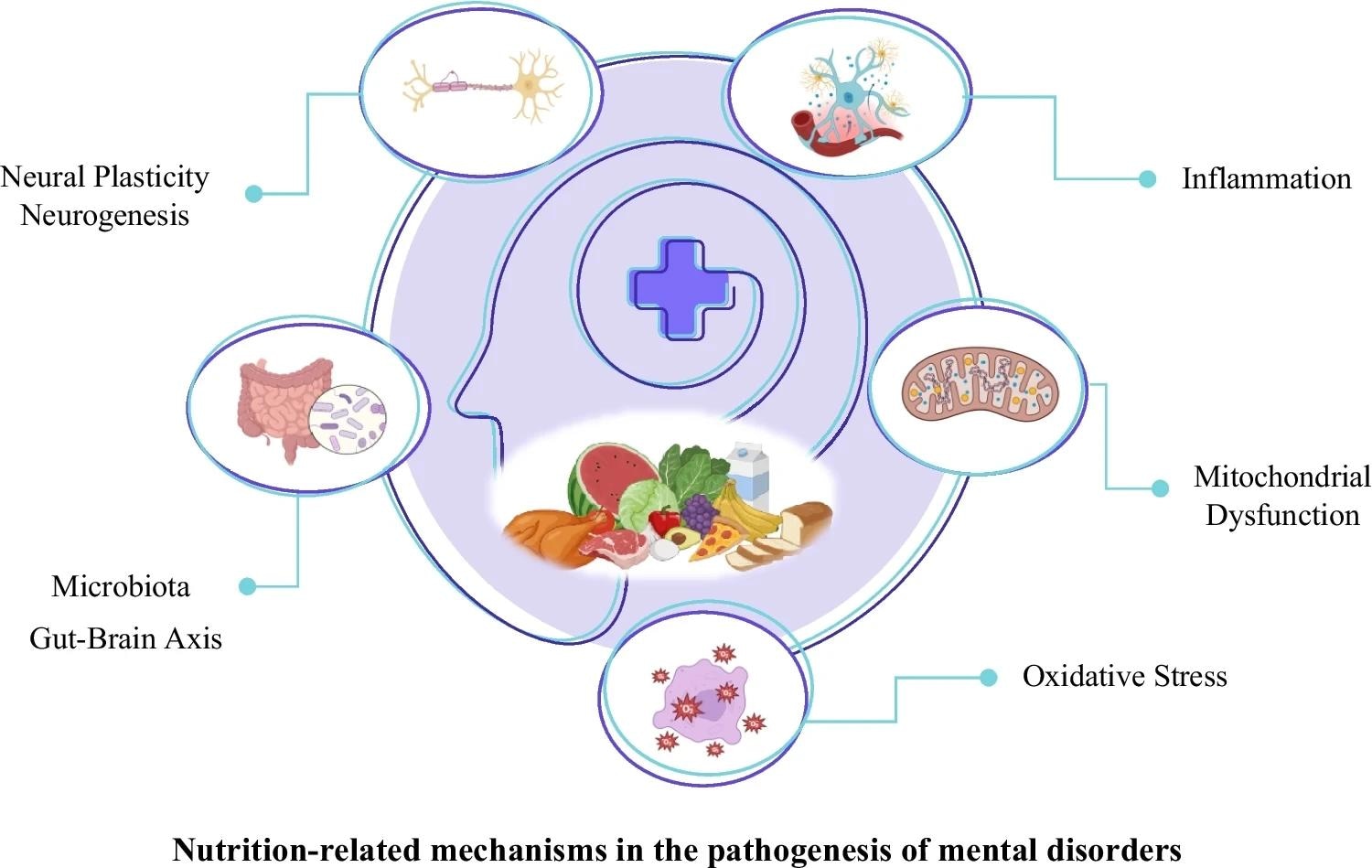Introduction
Origins and development of the MIND diet
How the MIND diet works
Foods to eat frequently
Foods to limit
Health benefits of the MIND diet
Scientific evidence and clinical studies
Recent news and developments
Comparisons to other brain-healthy diets
Conclusions
References
Further reading
By targeting inflammation, oxidative stress, and vascular dysfunction, the MIND diet provides a scientifically grounded, cost-effective nutritional approach to protect against dementia and support lifelong cognitive function.
 Image Credit: monticello / Shutterstock.com
Image Credit: monticello / Shutterstock.com
Introduction
Over the past several years, the MIND diet, which is short for Mediterranean-Dietary Approaches to Stop Hypertension (DASH) Intervention for Neurodegenerative Delay, has gained the attention of health experts and the public for its potential to protect brain health and reduce the risk of Alzheimer’s disease.1
Origins and development of the MIND diet
In 2015, Dr. Martha Clare Morris and her team at Rush University developed the MIND diet, based on observational studies that confirmed the role of healthy diets in achieving better cognitive outcomes. The MIND diet is a hybrid of the Mediterranean and DASH diets, incorporating the most neuroprotective components of these diets, including berries, nuts, leafy greens, and whole grains, while limiting intake of foods associated with cognitive decline, such as red meat and pastries.2
How the MIND diet works
The MIND diet reduces oxidative stress and inflammation in the brain, both of which are key factors in cognitive decline and the development of neurodegenerative diseases. The anti-inflammatory and antioxidant properties of the MIND diet components promote neuronal growth, vascular health, and synaptic flexibility while restricting the consumption of saturated fat-rich foods, which promote the formation of amyloid beta plaques in the brain, a major contributor to the development of cognitive impairment in Alzheimer's patients.5,6
Foods to eat frequently
- Green leafy vegetables and other vegetables: Individuals following the MIND diet are advised to consume at least six servings of leafy greens, including cooked greens, spinach, and kale, every week. The consumption of other vegetables, preferably non-starchy ones, one or more times daily, is also recommended, as these foods are nutrient-dense and low in calories.
- Berries: The MIND diet recommends consuming berries at least twice every week. Blueberries, strawberries, blackberries, and raspberries are rich in antioxidants that could reduce brain inflammation.
- Nuts, whole grains, olive oil, and beans: The MIND diet often involves consuming five or more servings of nuts, preferably in mixtures for varied benefits, each week. At least three servings of whole grains like quinoa, oatmeal, brown rice, 100% whole wheat bread, and whole wheat pasta every day are also recommended. Beans, including lentils and soybeans, should also be consumed at least four times every week.
- Fish and poultry: Fatty fish such as sardines, salmon, tuna, trout, and mackerel are rich in brain-boosting omega-3 fatty acids. Non-fried chicken or turkey can also be consumed two or more times every week.
- Wine: In early trials, moderate amounts of wine have been shown to support cognitive health; however, subsequent trials excluded wine due to safety concerns. The effects of alcohol vary by personal and family history; therefore, the inclusion of alcohol is considered a personal choice that must be discussed with healthcare providers.
Foods to limit
- Red meat, butter, margarine, and cheese: Red meat, including pork, beef, lamb, and their products, should be consumed three times or less every week. Butter/margarine consumption should also be limited to less than one tablespoon daily, whereas cheese should not be consumed more than once every week.
- Pastries, sweets, fried or fast food: Processed foods and desserts, such as cookies, ice cream, snack cakes, brownies, candy, and doughnuts, should be avoided, with a maximum of four desserts permitted per week. The MIND diet highly discourages fried food intake, with current recommendations permitting one serving each week.
 Image Credit: Shutterstock AI Generator / Shutterstock.com
Image Credit: Shutterstock AI Generator / Shutterstock.com
Health benefits of the MIND diet
The MIND diet can improve cognitive performance, memory, and mood while preventing neurodegenerative disorders, including Alzheimer's and related dementia.
 Nutrition-related mechanisms in the pathogenesis of mental disorders9
Nutrition-related mechanisms in the pathogenesis of mental disorders9
Cognitive function and memory
Even moderate adherence to the MIND diet has been shown to reduce the risk of cognitive impairment and Alzheimer's disease.3 In a 2023 study, middle-aged adults who followed the MIND diet exhibited faster information processing speed than those who did not.4
Similar results were reported in a 2022 randomized controlled trial (RCT), during which individuals who followed the MIND diet for three months scored higher on verbal recognition memory, working memory, and attention than those in the calorie-restricted control group.5
Alzheimer’s disease risk reduction
Previous studies have reported a 53% reduced risk of Alzheimer’s disease among individuals with the highest adherence to the MIND diet. Study participants with moderate adherence were also 35% less likely to develop Alzheimer’s disease as compared to those with the lowest MIND scores.7
Stroke and vascular dementia
The MIND diet shares similarities with the DASH diet, as it promotes vascular health by reducing cardiovascular risks, such as hypertension and stroke, improving blood vessel function, and lowering inflammation. These benefits enhance blood flow to the brain, thereby supporting cognitive function and lowering the risk of small vessel disease and dementia.
Specifically, the MIND diet encourages the consumption of neuroprotective foods such as fish, leafy greens, and berries, which slow cognitive decline and reduce the risk of Alzheimer's disease.7,8
Mood, depression, and mental health
The plant-based components of the MIND diet contain antioxidants that reduce inflammation and support brain health. High in fiber, these foods support a healthy gut microbiome, which helps increase the release of neurotransmitters like serotonin, thereby improving sleep and mood.
In addition to fiber, complex carbohydrates in the MIND diet increase insulin sensitivity and stabilize blood sugars, thereby preventing mood swings that may arise from fluctuating blood sugar levels. The MIND diet also limits the consumption of processed foods, which are associated with cognitive decline.10,11
Mayo Clinic Minute: Can the MIND diet improve brain health?
Scientific evidence and clinical studies
Observational studies, such as the Rush Memory and Aging Project (MAP), indicate that greater adherence to the MIND diet is associated with slower cognitive decline and a reduced risk of Alzheimer’s disease among older adults.7 More recently, a multiethnic cohort study of over 92,000 participants reported that high adherence to the MIND diet is associated with a 9% lower risk of dementia, with these benefits observed across diverse racial and age groups, including those who started the diet later in life.12
However, most scientific evidence has been derived from self-reported dietary data, which may introduce bias. As a result, large-scale randomized controlled trials (RCTs) are required to validate these findings.10
Randomized controlled trials like the Multidomain Alzheimer Preventive Trial (MAPT) and ENLIGHTEN-MIND have also investigated the effects of the MIND diet on cognition. The MAPT study, for example, evaluated the effectiveness of omega-3 supplementation, a multidomain intervention comprising exercise, nutrition counseling, and cognitive stimulation, or a combination of both, on cognitive performance among older adults. A sub-analysis showed that the MIND diet was associated with slower cognitive decline in stroke survivors.
The ENLIGHTEN-MIND trial, which followed over 14,000 participants for ten years, suggests that higher adherence to the MIND diet improves brain functions, such as working memory and attention, and a slower rate of cognitive decline.7,12
Recent news and developments
The MIND diet encourages the consumption of a diverse range of plant-based meals, including fruits, vegetables, and whole grains, which provide various essential nutrients, such as omega-3 fatty acids, zinc, and iron. The inclusion of these foods into the diet during early childhood can promote long-term brain health and delay cognitive decline. The MIND diet also discourages the consumption of processed snacks and sugary drinks, which can impair executive function in children and adolescents.13-16
Overall, the MIND diet is a scientifically supported, practical, cost-effective, and widely available strategy to support brain health and prevent dementia. As a result, this diet is suitable for inclusion in national or regional dietary guidelines that address public health concerns related to aging and cognitive decline. Importantly, the MIND diet may require personalization based on individual apolipoprotein E (APOE4) status.10,18
Comparisons to other brain-healthy diets
The Mediterranean, DASH, and MIND diets share many similarities, including an emphasis on plant-based foods, healthy fats, and limited intake of processed and sugary foods. However, each diet has been created to achieve specific health goals. Whereas the DASH diet aims to lower blood pressure, the Mediterranean diet promotes overall health and longevity, and the MIND diet focuses on brain health.3,6
Conclusions
The MIND diet is a promising approach to enhancing brain health and potentially reducing the risk of Alzheimer’s disease. Recognizing brain health as part of whole-body wellness, the MIND diet could enhance holistic well-being.
Continued research is essential to customize the MIND diet to individual needs, thereby improving its effectiveness in protecting the brain against neurodegeneration.
References
- ALZHEIMER'S ASSOCIATION REPORT. 2025 Alzheimer's disease facts and figures. Alzheimers Dement, 21(4):e70235, DOI: 10.1002/alz.70235, https://alz-journals.onlinelibrary.wiley.com/doi/10.1002/alz.70235
- Diet Review: MIND Diet. The Nutrition Source. Harvard T.H. Chan School of Public Health, https://nutritionsource.hsph.harvard.edu/healthy-weight/diet-reviews/mind-diet/. Accessed on 10 June 2025.
- Hosking DE, Eramudugolla R, Cherbuin N, Anstey KJ. (2019). MIND, not Mediterranean diet related to the 12-year incidence of cognitive impairment in an Australian longitudinal cohort study. Alzheimers Dement, 15(4):581-589, DOI: 10.1016/j.jalz.2018.12.011, https://alz-journals.onlinelibrary.wiley.com/doi/10.1016/j.jalz.2018.12.011
- Holthaus TA et al. (2023). MIND Dietary Pattern Adherence Is Selectively Associated with Cognitive Processing Speed in Middle-Aged Adults. J Nutr., 152(12):2941-2949, DOI: 10.1093/jn/nxac203, https://linkinghub.elsevier.com/retrieve/pii/S0022316623086832
- Arjmand G, Abbas-Zadeh M, Eftekhari MH. (2022). Effect of MIND diet intervention on cognitive performance and brain structure in healthy obese women: a randomized controlled trial. Sci Rep., 12(1):2871, DOI: 10.1038/s41598-021-04258-9, https://www.nature.com/articles/s41598-021-04258-9
- Aleksandrova K, Koelman L, Rodrigues CE. (2021). Dietary patterns and biomarkers of oxidative stress and inflammation: A systematic review of observational and intervention studies. Redox Biol., 42:101869, DOI: 10.1016/j.redox.2021.101869, https://www.sciencedirect.com/science/article/pii/S2213231721000173
- Morris MC, Tangney CC, Wang Y, Sacks FM, Bennett DA, Aggarwal NT. (2015). MIND diet is associated with reduced incidence of Alzheimer's disease. Alzheimer's Dement., 11(9):1007-14, DOI: 10.1016/j.jalz.2014.11.009, https://alz-journals.onlinelibrary.wiley.com/doi/10.1016/j.jalz.2014.11.009
- Aline Thomas et al. (2022). Association of a MIND Diet with Brain Structure and Dementia in a French Population. The Journal of Prevention of Alzheimer's Disease,9(4): 655-664, DOI: 10.14283/jpad.2022.67, https://www.sciencedirect.com/science/article/pii/S2274580724002747
- Dal N, Bilici S. (2024). An Overview of the Potential Role of Nutrition in Mental Disorders in the Light of Advances in Nutripsychiatry. Curr Nutr Rep., 13(2):69-81, DOI: 10.1007/s13668-024-00520-4, https://link.springer.com/article/10.1007/s13668-024-00520-4
- Timlin, D., McCormack, J.M., Kerr, M. et al. (2025). The MIND diet, cognitive function, and well-being among healthy adults at midlife: a randomised feasibility trial. BMC Nutr 11:59, DOI: 10.1186/s40795-025-01020-6, https://bmcnutr.biomedcentral.com/articles/10.1186/s40795-025-01020-6
- Clapp M, Aurora N, Herrera L, Bhatia M, Wilen E, Wakefield S. (2017). Gut microbiota's effect on mental health: The gut-brain axis. Clin Pract., 7(4):987, DOI: 10.4081/cp.2017.987, https://www.mdpi.com/2039-7283/7/4/987
- Song-Yi Park et al. (2025). The MIND Diet and Incidence of Alzheimer's Disease and Related Dementias Among Five Racial and Ethnic Groups in the Multiethnic Cohort Study, Current Developments in Nutrition, 9(2):106016, DOI: 10.1016/j.cdnut.2025.106493, https://cdn.nutrition.org/article/S2475-2991(25)01953-5/fulltext
- Kelly C Cara ∙ Paul F Jacques ∙ Tammy M Scott ∙ Mei Chung. (2024). Associations Between Dietary Pattern and Global Cognitive Ability Trajectories Across the Life Course: Longitudinal Analysis of the 1946 British Birth Cohort, 8(2):102174, DOI: 10.1016/j.cdnut.2024.102174, https://linkinghub.elsevier.com/retrieve/pii/S2475299124001082
- Sawyer RP, Blair J, Shatz R, Manly JJ, Judd SE. (2024). Association of Adherence to a MIND-Style Diet With the Risk of Cognitive Impairment and Decline in the REGARDS Cohort. Neurology, 103(8):e209817m DOI: 10.1212/WNL.0000000000209817, https://www.neurology.org/doi/10.1212/WNL.0000000000209817
- Boushra Dalile, PhD et al. (2022). The EAT–Lancet reference diet and cognitive function across the life course, 6(9):e749-e759, DOI: 10.1016/S2542-5196(22)00123-1, https://www.thelancet.com/journals/lanplh/article/PIIS2542-5196(22)00123-1/fulltext
- Seema Puri, Majida Shaheen, Bhanvi Grover. (2023). Nutrition and cognitive health: A life course approach. Front Public Health, 27;11:1023907, DOI: 10.3389/fpubh.2023.1023907, https://www.frontiersin.org/journals/public-health/articles/10.3389/fpubh.2023.1023907/full
- Tori A Holthaus et al. (2022). MIND Dietary Pattern Adherence Is Selectively Associated with Cognitive Processing Speed in Middle-Aged Adults, The Journal of Nutrition, 152(12):2941-2949, DOI: 10.1093/jn/nxac203, https://linkinghub.elsevier.com/retrieve/pii/S0022316623086832
- de Crom TOE, Mooldijk SS, Ikram MK, Ikram MA, Voortman T. (2022). MIND diet and the risk of dementia: a population-based study. Alzheimers Res Ther., 14(1):8, DOI: 10.1186/s13195-022-00957-1, https://alzres.biomedcentral.com/articles/10.1186/s13195-022-00957-1
- Dementia: number of people affected to triple in next 30 years. World Health Organization, https://www.who.int/news/item/07-12-2017-dementia-number-of-people-affected-to-triple-in-next-30-years. Accessed on 10 June 2025.
Further Reading
Last Updated: Jun 17, 2025